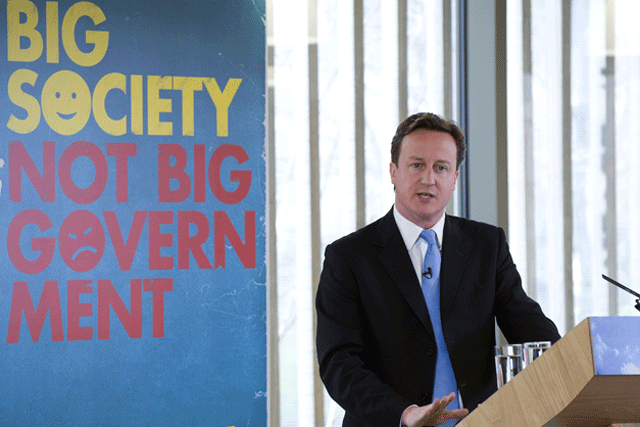The 'Big society' was undoubtedly the dominant theme running through David Cameron's first speech as prime minister at the Conservative Party conference last week.
At the core of the idea, which got its first public airing in the run-up to the general election, is affording people greater control of community life by allowing them to run public services such as post offices and libraries.
The concept has been the subject of criticism both from inside and outside the Conservative Party. Its detractors claim the concept is hazy and plays badly on the doorstep. Despite this, Cameron has persevered with it and used the annual Tory jamboree to enlighten the party faithful and the wider British public on his vision, which also looks set to receive the support of some big-name brands.
'The spirit that we need is the Big society spirit,' he told the audience in Birmingham. 'Saying to business, faith groups, charities, social enterprises - come in and provide a great service,' he added later.
Brands on board
Away from the main stage, the fringe circuit also buzzed with talk of the idea. Sitting alongside party members in the various conference sessions were representatives from some of the UK's biggest brands, such as Starbucks, which co-sponsored a fringe event with The New Statesman called 'Big Brands and The Big Society'.
At the event, Starbucks head of advocacy and responsibility Claire Levens outlined 'Realising potential', a project being piloted by the coffee chain in Brighton to enable groups to bid for cash and volunteer time to support community initiatives. While the scheme ticks all the 'Big society' boxes, it is not formally aligned to the government's drive. Asda, however, has gone one step further by signing up its charity foundation to an organisation called The Big Society Network (Marketing, 6 October).
The network bills itself as an 'independently funded and run voice of the citizen ...
set up by frustrated citizens for frustrated citizens, to help everyone achieve change in their local area'. The organisation's website, however, acknowledges that 'much of the inspiration for the creation for the network' came from a lecture given by Cameron last year.
The Big Society Network's chief executive, Paul Twivy, acknowledges that the organisation's name could be 'divisive'. He adds: 'It's very hard because it is a brand that was created by Cameron and (his director of strategy) Steve Hilton.'
He also reveals it is seeking charitable status and that, if achieved, the renamed 'Society Network Foundation' will be held to account by an independent steering group.
Twivy wants to attract brands such as retailers and banks with close links to the communities they serve to give financial backing to the network's flagship project, 'Your Square Mile', which will encourage people to improve their locality. Twivy says that in the first instance he wants brands to promote the project's existence and communicate its aims, before supporting its subsequent roll-out.
Giles Gibbons, chief executive of CSR consultancy Good Business, which he founded with Hilton, insists that brands are already involved in the creation of the 'Big society' vision and have been for years. He cites projects such as 'Pepsi Refresh', which funds community initiatives devised by members of the public, and 'O2 Think Big', a similar scheme aimed specifically at young people.
'Corporate responsibility has been a test-bed for a lot of the principles behind the "Big society",' says Gibbons.
Note of caution
The spotlight that Cameron has thrown on such corporate-sponsored activity is likely to encourage other chief executives to get their companies on board.
However, Mario Ambrosi, head of communications at Anchor, a not-for-profit housing and care provider to older people, warns commercial brands considering involvement to proceed with caution.
'There's still an enormous amount of scepticism and concern among the public that it simply means individuals doing stuff the state once did. Profit-seeking brands thinking of stepping into this territory need to be careful that they are not viewed with suspicion,' he argues.
In his speech last week, Cameron sought to attack the notion that 'Big society' was about creating cover for swingeing government cuts, but he then muddied the water somewhat by linking the one with the other. 'Big society,' he said, 'means we must face up to this nation's debt.'
While most commentators support key tenets of the idea such as localism and volunteering, brands considering labelling any of their CSR activities under the 'Big society' banner must consider what the idea will mean to consumers and relevant stakeholders once the cuts begin to bite.


